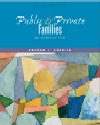 |
1 |  | 
The author's study of grandparents in Baltimore suggested that the majority of the elderly would like to live with their adult children and grandchildren. |
|  | A) | True |
|  | B) | False |
 |
 |
2 |  | 
Scholars believe that grandparenthood as a separate and expected stage of life for most adults is actually a post-World War II phenomenon. |
|  | A) | True |
|  | B) | False |
 |
 |
3 |  | 
Gerontologists define the "old-old" as those people who are 85 and over. |
|  | A) | True |
|  | B) | False |
 |
 |
4 |  | 
Medicare is the government program health insurance for the elderly regardless of income; Medicaid is the government program of health insurance for the poor of all ages. |
|  | A) | True |
|  | B) | False |
 |
 |
5 |  | 
Because of their greater economic resources, most family members who care for their elderly relatives are men. |
|  | A) | True |
|  | B) | False |
 |
 |
6 |  | 
Intergenerational solidarity refers to the characteristics of family relationships that knit the generations together, such as visits, assistance, and emotional ties. |
|  | A) | True |
|  | B) | False |
 |
 |
7 |  | 
Recent studies suggest that the majority of the elderly are geographically and emotionally isolated from their kin, having little contact on a regular basis. |
|  | A) | True |
|  | B) | False |
 |
 |
8 |  | 
The level of "affinity" between the generations is influenced by shared values, attitudes, and beliefs, the gender of the relationship, and the timing of the life-cycle. |
|  | A) | True |
|  | B) | False |
 |
 |
9 |  | 
In terms of assistance between generations, adult children tend to provide more personal support such as comfort and care during an illness, and older parents tend to provide their children with more financial assistance. |
|  | A) | True |
|  | B) | False |
 |
 |
10 |  | 
Adult children of divorced parents report the same warmth of emotional ties and the same level of mutual assistance as adult children of intact marriages. |
|  | A) | True |
|  | B) | False |
 |



 2002 McGraw-Hill Higher Education
2002 McGraw-Hill Higher Education